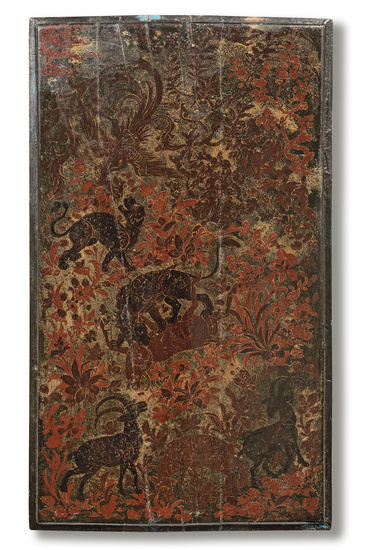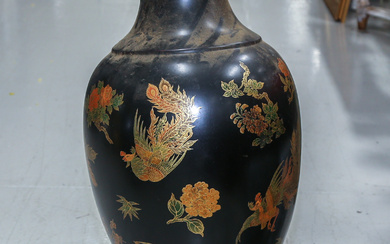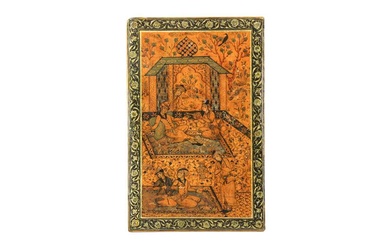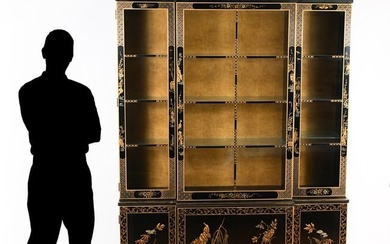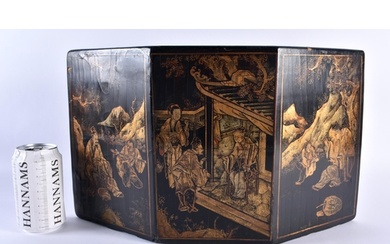A rare large painted and lacquered wood panel, depicting animals...
A rare large painted and lacquered wood panel, depicting animals and birds amongst foliage and vegetation
Safavid Persia, probably Tabriz or Qazwin, mid-16th Century
wood panel with bevelled edges painted in gold, red, brown and black, all on a gold-sprinkled green ground
painted surface 81 x 46.5 cm.; total including bevelled edges 84 x 49.5 cm.
Provenance
Sotheby's, Arts of the Islamic World, 22nd April 1999, lot 44.
While compositions depicting wild beasts and birds in their natural habitat are familiar to us from the margins of Persian illuminated manuscripts, and from relatively small bookcovers, this panel is remarkable for its size, as well as the quality of the painting. Its size and its bevelled edges suggest that it was a wall or door panel.
The composition depicts two kylins (or qilin in East Asian mythology), in the central band, and three mountain goats below. One kylin, it seems, is being attacked by the emblematic Persian mythical creature, the simurgh, while the other kylin is grappling with a fourth goat. A more sedate bird is perched at upper centre.
Manuscript illustration and illumination which bears a resemblance to this composition are various, and include: the opening leaves of the Amir Husain Beg Album (1560-61, Topkapi, Istanbul); a manuscript of Sa'di's Gulistan, dated 1468-69, of which the borders were decorated circa 1525-40 (see A. Soudavar, Art of the Persian Courts, Los Angeles 1992, pp. 178-179, 332-334, no. 136); the border in a manuscript of Jami's Haft Awrang (1556-65), known as the 'Freer Jami' (see M. S. Simpson, Haft Awrang of Sultan Ibrahim Mirza, Washington 1997, p. 131); and the borders of a leaf from a dispersed manuscript of nasta'liq calligraphy, attributed to Sultan Muhammad, the chief painter of Shah Tahmasp's court workshop at Tabriz (see Sotheby's, Oriental Manuscripts and Miniatures, 23rd April 1997, lot 31).
The infilling of the bodies of the five quadrupeds (as well as some of the rocks and trees) with grotesque faces are also typical of mid-16th Century illustration (see for example the illustrations to Shah Tahmasp's Shahnama, circa 1525-40). It might, incidentally, also provide a starting point for the well-known 'composite' animals, peopled with human figures and demons, found in Mughal and other Indian painting from the 17th-19th Century.
Important Notice to Buyers
Some countries e.g., the US, prohibit or restrict the purchase by its citizens (wherever located) and/or the import of certain types of Iranian-origin works. As a convenience to buyers, Bonhams has marked with the symbol R all lots of Iranian (Persian) origin. It is each buyer's responsibility to ensure that they do not bid or import a lot in contravention of the sanctions or trade embargoes that apply to them.
View it on
Sale price
Estimate
Time, Location
Auction House
A rare large painted and lacquered wood panel, depicting animals and birds amongst foliage and vegetation
Safavid Persia, probably Tabriz or Qazwin, mid-16th Century
wood panel with bevelled edges painted in gold, red, brown and black, all on a gold-sprinkled green ground
painted surface 81 x 46.5 cm.; total including bevelled edges 84 x 49.5 cm.
Provenance
Sotheby's, Arts of the Islamic World, 22nd April 1999, lot 44.
While compositions depicting wild beasts and birds in their natural habitat are familiar to us from the margins of Persian illuminated manuscripts, and from relatively small bookcovers, this panel is remarkable for its size, as well as the quality of the painting. Its size and its bevelled edges suggest that it was a wall or door panel.
The composition depicts two kylins (or qilin in East Asian mythology), in the central band, and three mountain goats below. One kylin, it seems, is being attacked by the emblematic Persian mythical creature, the simurgh, while the other kylin is grappling with a fourth goat. A more sedate bird is perched at upper centre.
Manuscript illustration and illumination which bears a resemblance to this composition are various, and include: the opening leaves of the Amir Husain Beg Album (1560-61, Topkapi, Istanbul); a manuscript of Sa'di's Gulistan, dated 1468-69, of which the borders were decorated circa 1525-40 (see A. Soudavar, Art of the Persian Courts, Los Angeles 1992, pp. 178-179, 332-334, no. 136); the border in a manuscript of Jami's Haft Awrang (1556-65), known as the 'Freer Jami' (see M. S. Simpson, Haft Awrang of Sultan Ibrahim Mirza, Washington 1997, p. 131); and the borders of a leaf from a dispersed manuscript of nasta'liq calligraphy, attributed to Sultan Muhammad, the chief painter of Shah Tahmasp's court workshop at Tabriz (see Sotheby's, Oriental Manuscripts and Miniatures, 23rd April 1997, lot 31).
The infilling of the bodies of the five quadrupeds (as well as some of the rocks and trees) with grotesque faces are also typical of mid-16th Century illustration (see for example the illustrations to Shah Tahmasp's Shahnama, circa 1525-40). It might, incidentally, also provide a starting point for the well-known 'composite' animals, peopled with human figures and demons, found in Mughal and other Indian painting from the 17th-19th Century.
Important Notice to Buyers
Some countries e.g., the US, prohibit or restrict the purchase by its citizens (wherever located) and/or the import of certain types of Iranian-origin works. As a convenience to buyers, Bonhams has marked with the symbol R all lots of Iranian (Persian) origin. It is each buyer's responsibility to ensure that they do not bid or import a lot in contravention of the sanctions or trade embargoes that apply to them.
